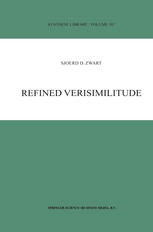

Most ebook files are in PDF format, so you can easily read them using various software such as Foxit Reader or directly on the Google Chrome browser.
Some ebook files are released by publishers in other formats such as .awz, .mobi, .epub, .fb2, etc. You may need to install specific software to read these formats on mobile/PC, such as Calibre.
Please read the tutorial at this link: https://ebookbell.com/faq
We offer FREE conversion to the popular formats you request; however, this may take some time. Therefore, right after payment, please email us, and we will try to provide the service as quickly as possible.
For some exceptional file formats or broken links (if any), please refrain from opening any disputes. Instead, email us first, and we will try to assist within a maximum of 6 hours.
EbookBell Team

0.0
0 reviewsThe subject of the present inquiry is the approach-to-the-truth research, which started with the publication of Sir Karl Popper's Conjectures and Refutations. In the decade before this publication, Popper fiercely attacked the ideas of Rudolf Carnap about confirmation and induction; and ten years later, in the famous tenth chapter of Conjectures he introduced his own ideas about scientific progress and verisimilitude (cf. the quotation on page 6). Abhorring inductivism for its apprecia tion of logical weakness rather than strength, Popper tried to show that fallibilism could serve the purpose of approach to the truth. To substantiate this idea he formalized the common sense intuition about preferences, that is: B is to be preferred to A if B has more advantages andfewer drawbacks than A. In 1974, however, David Millerand Pavel Tichy proved that Popper's formal explication could not be used to compare false theories. Subsequently, many researchers proposed alternatives or tried to improve Popper's original definition.